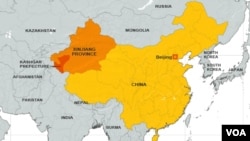Chinese authorities have arrested the remaining suspects allegedly involved in a clash with police that left 21 people dead in the northwest province of Xinjiang.
The government is calling last Tuesday's incident in the heavily ethnic Uighur area of Kashgar an act of religiously inspired terrorism, though activists dispute that account.
State media say 11 suspects were captured Monday, in addition to eight arrested at the scene. It said police seized a batch of "homemade explosives, lethal weapons, and flags of 'East Turkistan' terrorists."
Xinjiang police say the suspects belong to a terrorist group formed in September that has been watching extremist video tapes and attending outlawed religious events.
They say the group had tested the explosives and was planning to "do something big" in densely populated parts of Kashgar later this year, but did not elaborate.
China says it faces a growing threat from extremists in the predominantly Muslim Uighur community who want to form a separate state called East Turkistan.
But many Uighurs say China is exaggerating the threat in order to justify its heavy police presence and continued monitoring of Muslim institutions. Many also complain of religious and cultural discrimination resulting from a massive influx of Han Chinese.
Tensions in Xinjiang have been heightened since 2009, when over 200 people died in a series of riots that saw the Turkic-speaking Uighurs fight against state security forces and members of the Han majority ethnic group.
As is usually the case with such incidents, there was a disagreement about what led to last week's violence.
Police say the clashes began after the suspects attacked officials who had spotted them making explosives. But the World Uighur Congress, an exiled activist group, says the fighting began in response to the police shooting of a young Uighur during the illegal search of a home.
Chinese officials on Tuesday denied that ethnic or religious tensions were responsible for the violence. Regional governor Nur Bekri said the clash was a "terrorist act to split the motherland and undermine national unity."
Vice Minister of Public Security Meng Hongwei said the attack showed the terrorists "anti-human and anti-social nature." He vowed an "iron-handed crackdown against terrorism," saying police will use "every possible means to find and punish terrorists with no mercy."
The government is calling last Tuesday's incident in the heavily ethnic Uighur area of Kashgar an act of religiously inspired terrorism, though activists dispute that account.
State media say 11 suspects were captured Monday, in addition to eight arrested at the scene. It said police seized a batch of "homemade explosives, lethal weapons, and flags of 'East Turkistan' terrorists."
Xinjiang police say the suspects belong to a terrorist group formed in September that has been watching extremist video tapes and attending outlawed religious events.
They say the group had tested the explosives and was planning to "do something big" in densely populated parts of Kashgar later this year, but did not elaborate.
China says it faces a growing threat from extremists in the predominantly Muslim Uighur community who want to form a separate state called East Turkistan.
But many Uighurs say China is exaggerating the threat in order to justify its heavy police presence and continued monitoring of Muslim institutions. Many also complain of religious and cultural discrimination resulting from a massive influx of Han Chinese.
Tensions in Xinjiang have been heightened since 2009, when over 200 people died in a series of riots that saw the Turkic-speaking Uighurs fight against state security forces and members of the Han majority ethnic group.
As is usually the case with such incidents, there was a disagreement about what led to last week's violence.
Police say the clashes began after the suspects attacked officials who had spotted them making explosives. But the World Uighur Congress, an exiled activist group, says the fighting began in response to the police shooting of a young Uighur during the illegal search of a home.
Chinese officials on Tuesday denied that ethnic or religious tensions were responsible for the violence. Regional governor Nur Bekri said the clash was a "terrorist act to split the motherland and undermine national unity."
Vice Minister of Public Security Meng Hongwei said the attack showed the terrorists "anti-human and anti-social nature." He vowed an "iron-handed crackdown against terrorism," saying police will use "every possible means to find and punish terrorists with no mercy."
